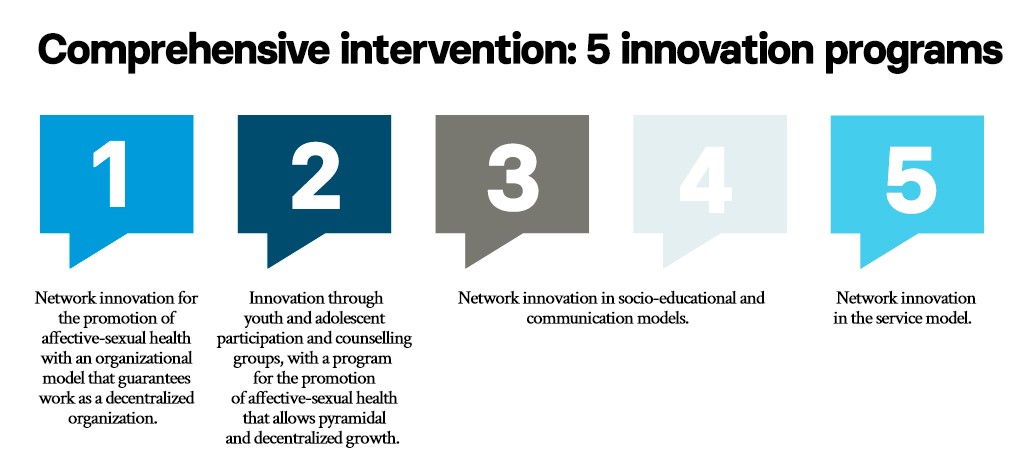Co-ResponS(H)ibility
Promoting an effective, systemic, collaborative and decentralized model of affective-sexual health.

About the Co-ResponS(H)ibility Innovation Network
In response to the growing need to guarantee a pleasurable and safe sexuality, free of discrimination, coercion, sexual and gender-based violence and sexually transmitted infections (STIs), among others, the multi-stakeholder project Co-ResponS(H)ibility was born. It is driven by the Living Lab for Health within the framework of the Barcelona CaixaResearch Living Lab and the European projects Xplore Health, EnRRICH, and InSPIRES (already completed).
It aims to facilitate an Innovation Network to foster the transition of the Affective-Sexual Health Promotion model to make it more effective, systemic, collaborative and decentralized, and to ensure the fulfilment of Sexual and Reproductive Rights.
Methodology and goals achieved
So far, the Co-ResponS(H)ibility Network has involved more than 47 social actors from more than 30 different organizations that have shown interest in defining and implementing actions in a coordinated manner. In a first iteration, a Collective Strategic Plan was designed and implemented within the framework of the European projects mentioned above. In a second iteration, a new Plan was designed in collaboration with the Barcelona City Council in the framework of the Sexual and Reproductive Health Strategy, which has been taken into account to improve the strategy of this Network.
First iteration
During 2016-19, Phases 1 to 3 of the Living Lab Methodology were implemented resulting in a Strategic and Action Plan, as well as the design and implementation of research projects focused on prioritized challenges in a participatory manner.
Most of the projects revolve around HIV, since during this first cycle the project was focused on the prevention of HIV and other STI. As a result of the participants' contributions, the project changed its focus to a more salutogenic and not so pathogenic approach; for this reason, it went from focusing on the prevention of HIV and other STI, to focus on the promotion of Affective-Sexual Health.
Listed below are the projects that were implemented, which followed the Science Shops methodology that promotes open and inclusive research:
-
Access to HIV diagnostic tests among the adolescent population in Catalonia: more information here.
-
Community-based participatory research project in collaboration with high school students on HIV-related stigma: more information here.
-
Development of an integrative proposal in the secondary school curriculum to incorporate affective-sexual health in collaboration with high school students: more information here.
-
Design of a campaign to promote HIV testing in a sex social network based on the analysis of users' needs: more information here.
-
The experiences and values of the social actors involved in the Co-ResponS(H)ibility project: more information here.
Second iteration
During a second strategic phase, the achievements were the consensus of a Strategic and Collective Action Plan with 5 Innovation Programs. This strategic phase was based on the Phase 1 methodology of Participatory Research for Strategy Design.
